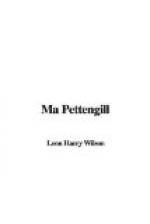The mincemeat shrapnel had proved fairly destructive, but the turnip marmalade didn’t seem to of developed much internal energy. All of them jars of marmalade proved to be what they call “duds.” But you bet enough had gone up to make a good battle sketch. The ketchup, especial, was venomous.
I met G.H. Stultz as I left the trenches. He’d been caught in a machine-gun nest of ketchup and had only wiped about half of it off his face. He looked like a contagious disease.
“Say, look here,” he says; “you can’t tell me there isn’t a Providence ever watching over this world to give some of us just what’s coming to us!” That was very silly, because I’d never told him anything of the sort.
Then I go out into No Man’s Land and meet Cousin Egbert by a lemonade stand. He was one radiant being. He asked me to have a glass of the beverage, and I done so; and while I was sipping it he says brightly:
“Wasn’t that some gorgeous display of fireworks? And wasn’t it fine to stand there and watch them bottles laugh their heads off at this food profiteer?”
I said he ought to be right sorry for her—after all the work she’d done.
“Not me!” he says firmly. “She never done any work in her life except to boost her own social celebrity.”
Then he took another gulp of his lemonade and says, very bitter:
“Madam Peach Blossom! I wonder what that funny little mite of hers will say when she sees her to-night? Something laughable, I bet—like it would be ’Madam Onion Blossom!’—or something comical, just to give her a good laugh after her hard day.”
Such is Cousin Egbert, and ever will be. And Genevieve May, having took up things all round the circle, is now back to the dance.
X
AS TO HERMAN WAGNER
It had been a toilsome day for Ma Pettengill and me. Since sunup we had ridden more than a score of mountain miles on horses that could seldom exceed a crawl in pace. At dawn we had left the flatlands along the little timbered river, climbed to the lava beds of the first mesa, traversed a sad stretch of these where even the sage grew scant, and come, by way of a winding defile that was soon a mounting canon, into big hills unending.
Here for many hours we had laboured over furtive, tortuous trails, aimless and lost, it might have seemed, but that ever and again we came upon small bands of cattle moving one way. These showed that we had a mission and knew, after all, what we were about. These cattle were knowingly bent toward the valley and home. They went with much of a businesslike air, stopping only at intervals to snatch at the sparse short grass that grows about the roots of the sagebrush. They had come a long journey from their grazing places, starting when the range went bad and water holes dried, and now seemed glad indeed to give up the wild free life of a short summer and become tended creatures again, where strangely thoughtful humans would lavish cut grass upon them for certain obscure but doubtless benevolent purposes of their own.




